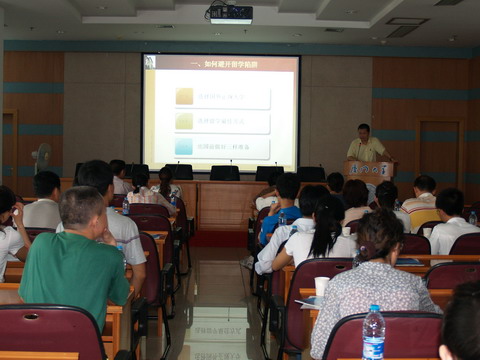On July 4, a lecture on studying abroad was co-hosted by the International College of Xiamen University and the Future Leaders Public Forum of Xiamen Daily at conference room 220 in Kah Kee Building of the University, themed on “how to avoid overseas studying traps and strengthen supervision on overseas students”. Professor Tongtao Zheng, dean of the International College/Overseas Education College, had a effective talk with students and parents present at the lecture and gave answers to various questions raised.

Professor Zheng shared his opinions on the education systems at home and abroad. In his view, the Chinese education system is not suitable for all students, and the exam-oriented education will stifle their creativity to some extent. It is paramount for education to cultivate students with innovation ability. Hence, studying abroad enables the students to acquire different ways to see problems and to broaden their thinking and worldviews. Those who have been studied abroad are able to make a comparison on the two different education systems and to handle problems in two different ways.
As for how to avoid traps on studying abroad, Professor Zheng suggested: firstly, formal universities identified by the Ministry of Education online should be selected , while the strength of specific majors and surroundings of the universities taken into account besides school ranking. It is not suggested to attend language schools abroad, because most of them are disqualified to run a school with a lack of government oversight, which leads to the increase of risks for overseas students. Moreover, the students should check their offers carefully and make sure that the issuer is the university itself instead of any of its partners.
Secondly, an effective way to avoid overseas studying traps is to choose the best approach of studying method. An international education institution of a formal domestic university is preferable. Because, besides the resources from a prestigious university, it usually integrates domestic and overseas quality education resources, and aims to cultivate practical talents with international vision while possessing a perfect system for teaching quality monitoring and students supervision, which enables it to offer a solid approach for students to study abroad.
Thirdly, preparations should be made to improve the proficiency of foreign language in order to adapt to the overseas teaching method and to learn about foreign customs and habits and particulars of the school that the student is about to attend. The different teaching method abroad usually requires students to look up data, make researches and form reports on their own in groups, highlighting the abilities to cooperate, to study independently and to work with others. Having a certain understanding on the national conditions and customs of the country where the student intends to study is beneficial to prevent some problems from occurring, like that of traffic rules and accommodation.
As to the highly-concerned issue of supervision on students abroad, Professor Zheng suggested the parents and the institutions shall make their concerted efforts to ensure the successful completion of overseas studies of the students. In order to promote the development of the students, the parents should change their supervision pattern of taking care of everything for their children at home and learn to have confidence in their children on the one hand and seek a reliable channel for their children to study abroad on the other hand.
In addition, Professor Zheng pointed out that domestic institutions engaging in cooperative education should establish an efficient supervision mechanism to intensify the management of overseas students. In the first place, cooperative education agreements should be signed to legally safeguard the security and stability of overseas studying. In the second place, the domestic and foreign institutions should work together as an organic body, communicating directly in course connection and students administration to ensure the smooth transition of the students to overseas life. The feedbacks from SQA HND students show that they enjoy a remarkable advantage in adaption to English classes and thesis writing over those studying abroad after finishing the undergraduate program at home. In the third place, the institutions should exchange visits to form regular contact methods and channels with each other and the students so as to provide timely assistance for overseas students to tackle any problems emerged in their studies and lives. Furthermore, the domestic institutions should keep close contact with the graduates and the foreign institutions for feedbacks.
At the end of the lecture, Professor Zheng shared his views on the questions raised by the parents on the “3+2” and “2+2” overseas education modes of the college, selection of countries for overseas studying, authentication of credentials from overseas universities, course connection at home and abroad and credit transfer, etc.